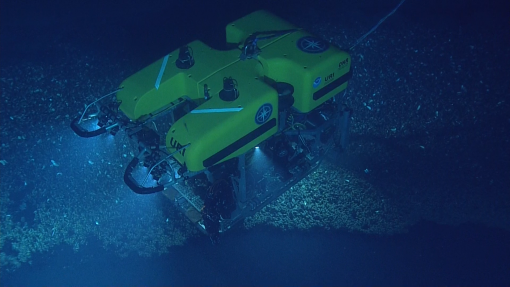Ocean Exploration Trust Joins Ocean Exploration Cooperative Institute

Ocean Exploration Trust joins $94 million Ocean Exploration Cooperative Institute to drive a new generation of exploration technology, innovation, and outreach capabilities.
The National Oceanic and Atmospheric Administration (NOAA) has announced a $94 million award for a cooperative institute comprising of five internationally renowned ocean science institutions hosted by the University of Rhode Island (URI) in partnership with the Ocean Exploration Trust (OET), Woods Hole Oceanographic Institution, University of New Hampshire, and University of Southern Mississippi. These institutions, which will act as a single entity known as the Ocean Exploration Cooperative Institute (OECI), will bring to NOAA’s Office of Exploration and Research (OER) their respective substantial exploration, scientific, technological, and engineering resources and expertise to drive a new generation of exploration technology, innovation, and education and outreach capabilities.
The OECI will spend the next five years working closely with NOAA OER to explore and survey an estimated 3 billion acres of submerged US territory.
“There is another half of America, beneath the ocean’s surface, that we know very little about,” said Dr. Robert Ballard, lead principal investigator of OECI, President of the Ocean Exploration Trust, and Director of the Center for Ocean Exploration at University of Rhode Island’s Graduate School of Oceanography. “U.S. territorial waters cover more ocean than those of almost any other country on Earth. Imagine we’re about to lead the next Lewis and Clark expedition, only six times over.”
The institute’s five members will combine their substantial exploration, scientific, technological and outreach resources and expertise in discovering this largely unexplored “New America.”
Collaborating with oceanographic research vessels and assets from all consortium members, this alliance will leverage facilities on the West Coast, Gulf Coast, and East Coast, serving as a truly national effort to advance ocean exploration. The collaborative missions will include the use of OET’s 64-meter Exploration Vessel Nautilus in addition to its remotely operated vehicles, mapping technologies, and west coast facility at AltaSea at the Port of Los Angeles. A Program Office to direct and plan exploration campaigns and coordinate with collaborative partners will operate from the Ocean Exploration Trust with headquarters in New London, CT, and offices at URI and AltaSea.
This five-year award, with potential for renewal for another 5 years, will help advance the OER and NOAA mission to deliver high-quality data and information needed to maintain a healthy ocean, aid responsible resource management, strengthen the national economy, and build a better appreciation of the value and importance of the ocean in the public’s everyday lives.
"With the Blue Economy expected to more than double its contribution to the U.S. economy and employ 40 million people by 2030, NOAA’s new cooperative institute will be on the front lines helping NOAA explore and characterize the 3 billion acres of U.S. ocean territory,” said retired Navy Rear Adm. Tim Gallaudet, Ph.D., assistant secretary of commerce for oceans and atmosphere and deputy NOAA administrator. “The Blue Economy relies on data and information to inform science-based management and sustainable use of our ocean resources in support of economic growth, food security and our national security.”
While OECI’s scientific research will take place far from shore and deep underwater, the consortium will provide an opportunities for students, teachers, and other members of the public to interact with scientists and participate alongside researchers in real-time as they explore the nation’s ocean depths. Connecting to broad audiences ashore through telepresence-supported broadcasts and interactions, the OECI will focus outreach and training efforts on groups underrepresented in STEM fields, students, and the emerging workforce.
“Ocean discoveries will soon be made by robots that operate 24 hours a day, seven days a week while far out to sea and diving to great depths,” said Ballard. “But the future of ocean exploration will remain a human endeavor. We need the visionaries who develop ideas and new ways of exploring, engineers who make those ideas a reality, operators of the technology, and skilled communicators and educators who can explain the importance of these discoveries and inspire people around the world.”
